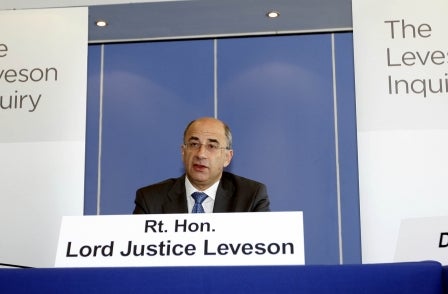
Conservatives have dismissed Labour plans for a Leveson law published today as lacking in detail as they prepare to produce the Government's draft Bill on press reform.
Shadow culture secretary Harriet Harman unveiled proposals that would put the Lord Chief Justice, head of the judiciary in England and Wales, in charge of overseeing a new self-regulatory body.
The party's six-clause Bill, which it says also enshrines freedom of the press into law, will be considered at cross-party talks on Thursday, according to Tory sources.
But the Government's own attempt at drafting legislation, which Conservatives said would show a law was unworkable, will also be produced in time for the meeting.
In the hours after the Leveson inquiry report was published Labour leader Ed Miliband said he believed the proposals should be "accepted in their entirety" but today's draft Bill drops support for involving broadcasting regulator Ofcom in any new system.
A Tory source said: "This new draft Bill completely rejects the involvement of Ofcom. They have gone from accepting the report in full to rejecting one of the major recommendations.
"We will look at the proposals at the cross-party talks. We are going to make sure (the government draft Bill) is ready for then.
"Not only have they u-turned, even they admit that their proposals are quite top line and don't address the details."
Labour's draft legislation calls for the Lord Chief Justice to head up a panel that decides if a new press watchdog is up to scratch. The group would recognise a self-regulatory body, which would then become a press standards trust, if it meets certain requirements, including being demonstrably independent of newspapers.
The new body would set a binding code of standards and would run an arbitration scheme to deal with civil complaints.
After two years, the recognition panel would carry out checks to ensure the new regulator is carrying out its work rigorously, followed by an assessment every three years after that.
The proposals would set in law major incentives to join the trust, including lower levels of high court damages and costs.
Harman said: "This Bill puts into effect the central recommendation of Lord Justice Leveson's report – legal backing for the new system of independent self-regulation by the press. The Bill would ensure that the system was verified at the outset and given a health check once every three years.
"This Bill is an offer to MPs on all sides of the House who want to implement Leveson's proposals. It shows that a Bill can be done in a way that is not cumbersome or invasive, and we look forward to discussing it in the cross-party talks on Thursday."
Deputy Prime Minister Nick Clegg discussed the proposals with Miliband by telephone last week.
A senior Lib Dem source said: "The Liberal Democrats welcome the publication of Labour's Bill as an important contribution to the cross-party talks.
"Although there is more work to be done to ensure that legislation is proportionate and workable it demonstrates that it should be possible to achieve this goal.
"The focus of the Liberal Democrats will be to work to further improve the Bill to make it very difficult to amend in the future.
"Liberal Democrats look forward to discussing this Bill with all parties alongside the draft that the Government is currently working on."
Bob Satchwell, executive director of the Society of Editors, said.
The industry is already taking urgent steps to create a new regulatory system as recommended by Leveson and it will study Labour’s proposals carefully. It notes that Labour has reflected and stepped back from the Leveson proposal for oversight by Ofcom but any new system must be free of statutory intervention both now and for the future.
What is equally important is that this should not be driven by party politics.. It is more important that the new body is as effective as both the press and public demand of it than to be driven by the Parliamentary timetable. Lord Justice Leveson heard evidence and deliberated for more than a year. Through Lord Hunt the industry has made huge steps to implement his recommendations without interfering with the valuable role the press plays in society.
Labour proposes a “guarantee” for media freedom but there cannot be a part free media and there lies the difficulty of recognising in law the system and which part of the media it affects.
It's not just a matter of practicalities in finding an effective and responsible system of regulation, but a vital principle that must not forgotten. The press represents and acts on behalf of the public, defending its right to know. The press fundamentally exists in order to scrutinise those in positions of power. It could not do that if those it was scrutinising were given any authority or the threat to exercise power over it.
Email pged@pressgazette.co.uk to point out mistakes, provide story tips or send in a letter for publication on our "Letters Page" blog
